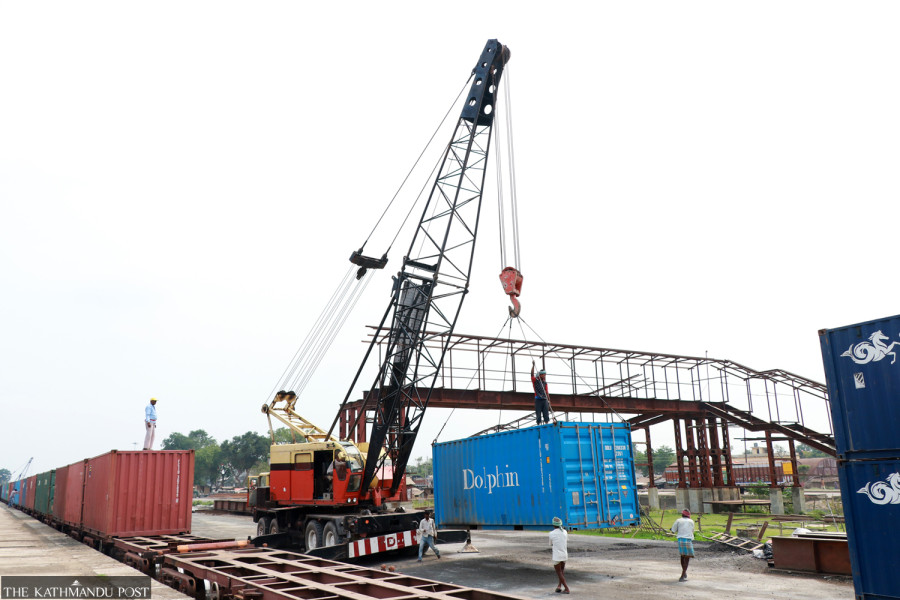Money
Rail cargo access reaches Biratnagar and Bhairahawa
Nepal-India Transit Treaty revised to allow all types of goods to be imported by rail to Biratnagar ICP and Nautanawa.
Krishana Prasain
Nepal has approved a letter of exchange amending the protocol of the Nepal-India Transit Treaty 2023, allowing the import of all types of goods—both container and bulk cargo—via rail to the Biratnagar Integrated Check Post (ICP) and Nautanawa, Sunauli near Bhairahawa.
Until now, the existing transit treaty only permitted cargo rail access to the Birgunj ICP.
The amendment was approved during Monday’s cabinet meeting, and Nepal sent the signed letter of exchange to India.
The amended protocol allows all cargo trains to operate through Biratnagar ICP and Nautanwa. Previously, the treaty permitted only four types of goods—coal, clinker, cement, and fertiliser—from third countries to be transported by rail.
“Now, this has expanded to include all goods,” said an official at the Ministry of Industry, Commerce and Supplies.
The official explained that when the original transit agreement was signed, the infrastructure at Biratnagar ICP was not fully developed, so the scope was limited to only those four goods.
The amendment now enables the import of goods—both in containers and bulk cargo—by rail.
The definition of bulk cargo has also been expanded in the updated protocol.
“Nepal has already sent the signed document. Once India sends its signed version, the amendment will come into effect,” the official added, noting that India has already agreed to the draft.
Currently, all cargo rail services are concentrated at Birgunj ICP. With the new amendment, rail cargo can also be routed through Biratnagar and Nautanwa, easing the pressure on Birgunj and reducing congestion.
“This is a major logistical improvement,” the official said. “Factories and firms around Biratnagar will benefit from lower trade costs and faster delivery times as goods can now arrive directly via rail.”
Although a railway line is yet to be built up to Bhairahawa ICP, the proximity of Nautanawa, Sunauli—just 7 km from Bhairahawa—means western Nepal can also benefit from it.
Transporting goods by rail is cheaper than through trucks, making this a cost-effective alternative for traders and manufacturers in the region.
Trade expert Rabi Shankar Sainju welcomed the move, stating that the newly operational Biratnagar rail link had been underused as bulk cargo movement was not permitted until now.
“Direct transport of goods from Visakhapatnam, India, to Biratnagar ICP will reduce costs by around 15 to 20 percent,” Sainju said. “Currently, cargo arrives in Birgunj from Visakhapatnam and is then reloaded onto trucks to reach Biratnagar. Alternatively, traders transport goods from Kolkata by road, which is more expensive and time-consuming.”
He added that the amendment will ensure a smoother supply chain, especially during customs delays or disruptions in one trade corridor.
However, Sainju emphasised the need for further reforms in Nepal’s transit framework.
“Despite agreements on inland waterways, they haven’t been operationalised. Railway connections should also gradually extend to other ICPs,” he said. “Moreover, the private sector must be oriented and informed about these updates to use new transit routes effectively.”
Sainju also suggested converting Janakpur’s underperforming passenger rail service into a cargo rail line, to the benefit of both countries.
He raised concerns about cartels among shipping liners and called for international recognition of Nepal’s dry ports to enable direct business-to-business negotiations. “This would break existing cartels and make trade more cost-effective,” he said.
India remains Nepal’s largest trade partner. According to the Department of Customs, Nepal exported goods worth Rs224.68 billion to India last fiscal year. At the same time, imports from India amounted to Rs1.07 trillion—resulting in a trade deficit of Rs846.51 billion.
During the Inter-Governmental Committee (IGC) meeting on Trade, Transit, and Cooperation to Control Unauthorised Trade, held in Kathmandu in January, India had agreed to conclude the letter of exchange initiated by Nepal. This paved the way for including all categories of goods in railway transport to Biratnagar and Bhairahawa.
At the same meeting, Nepal reiterated its request to use the Mundra Port in Gujarat and the Dhamra Port in Odisha for third-country trade. It also sought permission to conduct import and export via the Kolkata airport. Both sides agreed to finalise letters of exchange to address changes in transit routes during emergencies or disruptions.
Kolkata remains Nepal’s nearest seaport. India and Nepal first signed a Treaty of Trade and Transit in 1960, providing Nepal with transit access. The treaty is renewed periodically.
India continues to provide transit facilities for almost all of Nepal’s third-country trade. The two countries have a bilateral treaty of transit that guarantees transit rights through each other’s territories via mutually agreed routes and procedures. The treaty was most recently revised in June 2023 for seven years, with an automatic renewal for another seven years thereafter.
Nepal’s third-country transit trade is primarily routed through Kolkata/Haldia and Visakhapatnam ports. Nepal’s trade with Bhutan and Bangladesh also passes through Indian territory.
A letter of exchange operationalising Visakhapatnam Port was signed in February 2016 during Nepal’s prime minister’s India visit. Corresponding amendments were made in the Railway Services Agreement, enabling the flow of transit traffic between Visakhapatnam and Nepal’s Inland Container Depot in Birgunj.
Since then, Visakhapatnam has served as Nepal’s essential supplementary transit facility.




 12.12°C Kathmandu
12.12°C Kathmandu














